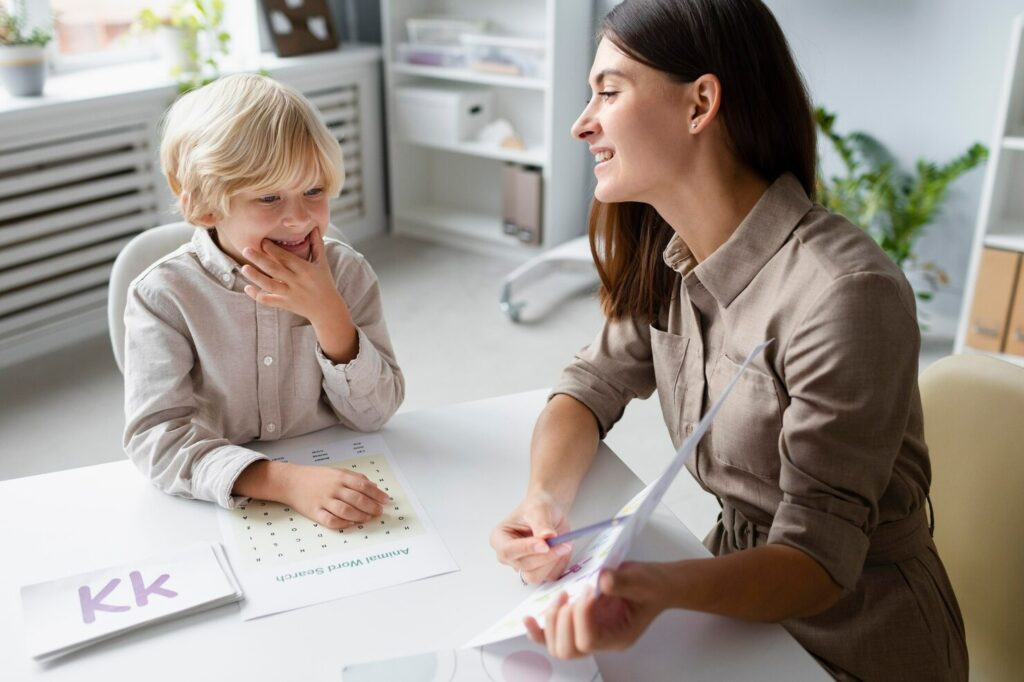
When a child says their first word, it feels magical—a small sound carrying an entire world of meaning. But for some children, finding those words, putting sentences together, or simply being able to express themselves does not come easily. They may have problems communicating, pronouncing words correctly, or understanding others. While many parents hope these challenges will “fix themselves with time,” early professional support often makes all the difference.
That’s where speech & language therapy comes in—a field that works with children to unlock their voices, improve communication, and build the confidence to connect with the world around them.
At Almighty Kids, we believe every child deserves the opportunity to express themselves freely and be understood. Speech and language therapy is not only about talking; it’s about connection, confidence, and growth.
Understanding Speech and Language Development
Speech and language are two closely connected yet different skills.
Speech is how we produce the sounds — our pronunciation, fluency, and clarity.
Language is the way in which we use words, grammar, and tone to express ideas and understand others.
A child can have trouble with either, or sometimes both. For example, some children understand exactly what they want to say but can’t pronounce the words correctly. Other children may speak very fluently but have difficulty understanding directions or putting sentences together that make sense.
Some of the complications that may arise include those pertaining to communication, learning, confidence, and social relationships.
Why Early Intervention Is So Important
Healthy speech and language development plays a huge role in a child’s overall growth. It influences how they learn, read, write, and interact. When communication doesn’t come naturally, frustration often follows—for both children and their parents.
The earlier a child receives therapy, the faster and better the progress. Early intervention helps:
- Enhance communication pathways in the brain.
- Prevent long-range academic and social problems.
- Improve emotional confidence and participation in everyday life.
At Almighty Kids, our therapists always remind parents: “Don’t wait for your child to catch up — help them grow into their full potential.”
Signs Your Child May Need Speech & Language Therapy
While every child learns at his or her own pace, there are specific signs that may signal the need for professional support. You might notice that your child:
- They have a limited vocabulary for their age.
- Has difficulty in forming sentences or narrating simple stories.
- Mispronounces or omits sounds (“tar” instead of “car,” “poon” instead of “spoon”).
- Has difficulty in understanding questions or directions.
- Stutters, repeats words, or pauses frequently.
- Avoids talking or becomes frustrated while speaking.
- Struggles to follow classroom instructions or conversations.
If any of these sound familiar, a speech and language assessment can help identify what’s happening and how to support your child effectively.
What Happens in Speech and Language Therapy?
Many parents are curious about what really takes place in speech therapy. At Almighty Kids, sessions are engaging, playful, and deeply personalized. The goal is to make communication fun, as children learn best when they’re relaxed and having a good time.
Here is how therapy usually goes:
- Assessment and Diagnosis
The therapist assesses your child’s communication abilities, including speech sounds, understanding, vocabulary, and social skills. This helps identify specific challenges and create a personalized therapy plan.
- Individualized Therapy Sessions
Therapists use games, flashcards, songs, and other creative tools to help children practice speech sounds, vocabulary, and comprehension. Every session feels like playtime but is built around structured learning.
- Parent Involvement
Parents play an important role. Tips, exercises, and techniques for daily communication are shared between therapists and families that can be implemented at home. The more consistent the practice is, the better the progress.
- Tracking Progress
Therapists review and update the plan regularly in regard to the child’s growth, celebrating every small step of progress.
The Role of Speech Therapists in Dubai
Dubai’s multicultural environment brings children from diverse linguistic backgrounds. Some grow up hearing multiple languages at home, while others adapt to new accents or speech models at school.
This can sometimes complicate or delay speech development — not because something is wrong, but because the brain is processing several linguistic systems at once.
Therefore, speech therapists from Almighty Kids and other Dubai-based centers are trained to handle children who grow up in bilingual and multilingual environments. That means they know how to distinguish between natural language mixing and actual communication delays, enabling them to provide the right kind of support to each child.
Final Thoughts
It’s so much more than just learning to speak clearly; speech & language therapy gives children a voice, connects them in meaningful ways, and lays the building blocks for lifelong learning and self-confidence.
When kids communicate better, they don’t just talk more—they laugh more, learn more, and live more fully. At Almighty Kids, we want to make that possible for every child. With compassion, patience, and expert care, we help children bridge the gap between what they feel and what they can express. Because when a child finds their voice, they don’t just speak; they shine.
If your child struggles with speech, language, or communication, contact Almighty Kids today.
